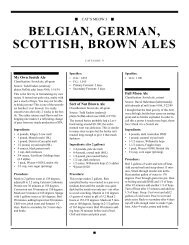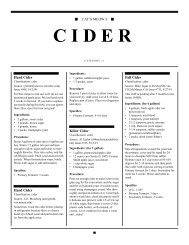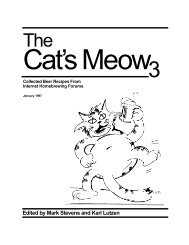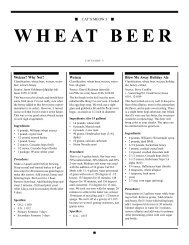STRONG BEERS - Home Brew Digest
STRONG BEERS - Home Brew Digest
STRONG BEERS - Home Brew Digest
You also want an ePaper? Increase the reach of your titles
YUMPU automatically turns print PDFs into web optimized ePapers that Google loves.
<strong>STRONG</strong> <strong>BEERS</strong>: BARLEYWINE, OLD ALE, <strong>STRONG</strong> ALE, DOPPLEBOCK<br />
Specifics:<br />
• O.G.: 1080<br />
• Primary ferment: 7 days<br />
• Secondary ferment: (length not<br />
specified)<br />
• Bitterness: 38 IBU<br />
Longhorn Fog Leg<br />
Classification: barleywine, all-grain<br />
Source: Greg Wolodkin (wolo@cory.Berkeley.EDU),<br />
r.c.b., 4/10/93<br />
More work than a regular batch, but worth<br />
it once in a while.<br />
Looking back, I think it would be possible<br />
to mash a few more pounds of grain and<br />
leave out the extract. Also I’m not sure the<br />
Cascades were the right choice for dryhopping<br />
in this beer, but I’m sure they will<br />
fade with time. Right now it’s two months<br />
old and I’ve only tasted one!! 47 bottles of<br />
beer on the wall...<br />
Ingredients:<br />
• 13 lb pale 2-row malt<br />
• 1 lb crystal malt (40L)<br />
• 4 oz chocolate malt<br />
• 3 lb pale dry malt extract<br />
• 1 lb dark brown sugar<br />
• Sierra Nevada ale yeast (Wyeast 1056)<br />
• Bittering hops (60 minute boil):<br />
1 oz Hallertau (4.6%)<br />
1 oz Kent Goldings (7.8%)<br />
1 oz Northern <strong>Brew</strong>er (7.5%)<br />
1 oz Cascade (5.8%)<br />
• Finishing hops (steep):<br />
1.0 oz Kent Goldings<br />
0.5 oz Cascade<br />
• Dry hop (in secondary, 2 weeks before<br />
bottling):<br />
0.5 oz Northern <strong>Brew</strong>er<br />
0.5 oz Cascade<br />
Procedure:<br />
Mash:<br />
Mash water: 4 gallons<br />
Mash-in: 130-121F for 30 minutes<br />
Starch conversion: 150F for 2.5 hours<br />
Mash-out: 170 for 5 minutes<br />
Sparge: 4 gallons at 170F<br />
Boil three hours total. Add extracts and<br />
hops with one hour remaining.<br />
Primary fermentation: Kraeusen fell in 6<br />
days.. your mileage may vary.<br />
Secondary: Racking restarted fermentation<br />
-- next time I do this I will rack *and*<br />
splash going into secondary, since the<br />
gravity at this point was only down to<br />
1.060. Beer stayed in secondary for about 6<br />
weeks total.<br />
Primed with 1/2c corn sugar.<br />
Specifics:<br />
• O.G.: 1106<br />
• F.G.: 1036<br />
Winter Warmer<br />
Classification: strong ale, extract<br />
Source: Charles Castellow (ccastell@<br />
eldec.com), HBD 1164, 6/17/93<br />
I thought that I’d try a “Winter Warmer”. I<br />
thought about using some specialty malts,<br />
but figured anything they might add would<br />
be overwhelmed by the malt and alcohol.<br />
This mades a very dark Strong Ale. I took<br />
this to the same friend’s Christmas party<br />
this past year along with an extract/ specialty<br />
malt Christmas ale (spices, oranges,<br />
etc.) Once again, both were emptied. However,<br />
those who had thought the stout was<br />
too dark/heavy/chewy had no problem<br />
drinking this dark strong ale, which was<br />
quite dark and very potent!<br />
Ingredients:<br />
• 8 lbs Dogbolter hopped malt extract<br />
syrup<br />
• 3 lbs rice syrup<br />
• 1 tsp Irish moss<br />
• <strong>Brew</strong>er’s Choice 1056 (American Ale)<br />
liquid yeast (in a pint of starter)<br />
Procedure:<br />
Bring 5 gallons of water to a boil. Add syrups,<br />
stirring vigorously until dissolved to<br />
avoid scorching. Boil for 15 minutes, adding<br />
Irish moss for final 5 minutes. Cool.<br />
Strain into carboy. Pitch yeast. Rack to secondary<br />
after about a week. After two<br />
weeks, rack to 5-gallon keg. Force carbonate.<br />
Chill to cellar temperature and serve.<br />
Garvin’s Old Ale #159<br />
Classification: old ale, strong ale, all-grain<br />
Source: Rick Garvin (rgarvin@btg.com),<br />
HBD Issue #1199, 8/9/93<br />
This beer won a ribbon at the AHA<br />
national competition.<br />
Ingredients: (for 7 gallons)<br />
• 14 pounds British Pale Ale malt<br />
• 1 pound 40 Lovibond Crystal malt<br />
• 4 ounces Mt. Hood hop pellets, 3.7%<br />
AA. Boil 70 minutes<br />
• 1 ounce Mt Hood hop pellets, 3.7% AA.<br />
Boil 10 minutes<br />
• 1 ounce BC Goldings hop pellets, 5.0%<br />
AA. End of boil<br />
• 1 tablespoon Irish Moss for last 15<br />
minutes<br />
• 16 ounces thick slurry Sierra Nevada<br />
strain yeast (Old Dominion Ale)<br />
• 3/4 cup corn sugar to prime<br />
Procedure:<br />
Single temperature infusion mash: Dough<br />
in malt with 1.33 qts/lb water (5 gallons)<br />
water at 165F for a sacharification rest<br />
154F-152F for 60 minutes. Sparge to collect<br />
9 gallons. Boil sweet wort for 30 minutes<br />
before adding hops. Chill and pitch.<br />
Specifics:<br />
• O.G.: 1.064<br />
• F.G.: 1.014<br />
• Primary Ferment: 1 week @ 65 degrees<br />
F.<br />
• Secondary Ferment: 1 week at 65<br />
degrees F.<br />
Tessellator<br />
Classification: dopplebock, bock, extract<br />
Source: James S. Murphy (jsm@mse.<br />
cmu.edu), r.c.b., 12/14/92<br />
Based on a recipe from “Country Wines”,<br />
Pittsburgh, PA.<br />
Ingredients:<br />
• 8 lbs Heidelberg Bavarian Bock Malt<br />
Dark<br />
• 1 lb M&F dry light<br />
• 1/4 lb Chocolate Malt, crushed<br />
• 1/8 lb Black Roasted Barley, crushed<br />
• 1/2 lb German light crystal, crushed<br />
• 2 ozs, Fresh Bullion Hops<br />
• 1/2 oz Fresh Chinnok Hops<br />
• 1 oz Fresh Perl Hops<br />
• 1/2 oz Compressed Kent Goldings<br />
• 1 tsp Irish Moss<br />
• 1 1/2 inches licorice, crushed<br />
• 2 pkgs Whitbred Ale yeast<br />
PAGE 139






